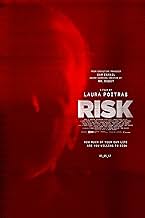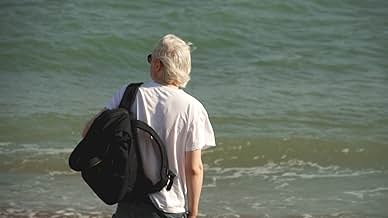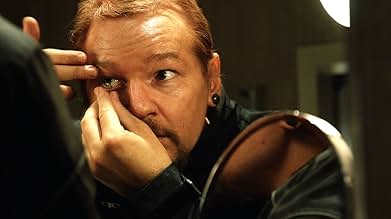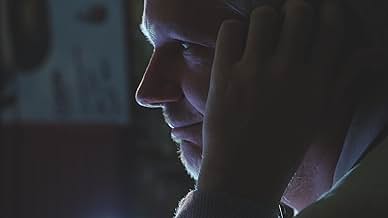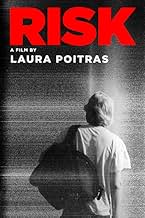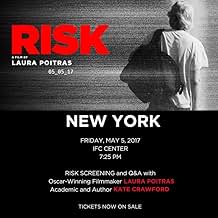CALIFICACIÓN DE IMDb
6.3/10
2.4 k
TU CALIFICACIÓN
El punto de vista de la documentalista Laura Poitras sobre la historia del editor en jefe de WikiLeak, Julian Assange.El punto de vista de la documentalista Laura Poitras sobre la historia del editor en jefe de WikiLeak, Julian Assange.El punto de vista de la documentalista Laura Poitras sobre la historia del editor en jefe de WikiLeak, Julian Assange.
- Dirección
- Guionistas
- Elenco
- Premios
- 4 nominaciones en total
Laura Poitras
- Self
- (voz)
Louis Bladel
- Self - FBI counterintelligence
- (as Special Agent Louis Bladel)
Hillary Clinton
- Self
- (material de archivo)
James Comey
- Self
- (material de archivo)
Anderson Cooper
- Self
- (archivo de sonido)
- Dirección
- Guionistas
- Todo el elenco y el equipo
- Producción, taquilla y más en IMDbPro
Opiniones destacadas
I watched the newest cut of Risk as of 5/7/17 with the director in attendance.
I went into Risk blind, as in, I had no prior knowledge of the film prior to seeing it. I was already a big fan personally Poitras' previous Oscar-winning documentary CITEZENFOUR, so I was expecting to get something similar in that sense, but what I got was something even more provocative. The viewer throughout the film is creating this image of Assange as more and more things come into light. At the same time, we get an in-depth look into the inner operations and daily struggle of one of the most famous/infamous, depending who you're asking, online warehouse of classified documents, WikiLeaks. This clash of truth, privacy, and freedom is experienced as the governments of the world begin question each others practices while also witnessing the personal struggle and persecution of the whistle-blowing community. All that, as told through the perspective of a documentary film-maker who puts so much at risk personally to capture the truth of everything that happens in this community that I personally have no extensive knowledge on. About Assange, the viewer is really left to observe this candid portrayal of the man behind the whole operation. A portrayal that even the subject doesn't agree with. That, along with the fact that we are living immediate consequences of the the events portrayed in the film, is what makes it so raw and so relevant to what we're living through right now.
I went into Risk blind, as in, I had no prior knowledge of the film prior to seeing it. I was already a big fan personally Poitras' previous Oscar-winning documentary CITEZENFOUR, so I was expecting to get something similar in that sense, but what I got was something even more provocative. The viewer throughout the film is creating this image of Assange as more and more things come into light. At the same time, we get an in-depth look into the inner operations and daily struggle of one of the most famous/infamous, depending who you're asking, online warehouse of classified documents, WikiLeaks. This clash of truth, privacy, and freedom is experienced as the governments of the world begin question each others practices while also witnessing the personal struggle and persecution of the whistle-blowing community. All that, as told through the perspective of a documentary film-maker who puts so much at risk personally to capture the truth of everything that happens in this community that I personally have no extensive knowledge on. About Assange, the viewer is really left to observe this candid portrayal of the man behind the whole operation. A portrayal that even the subject doesn't agree with. That, along with the fact that we are living immediate consequences of the the events portrayed in the film, is what makes it so raw and so relevant to what we're living through right now.
"Risk" (2017 re-release; 93 min.) is a documentary about Julian Assange by critically acclaimed (and Oscar-winning) writer-producer-director Laura Poitras. With basically unfettered access to Assange and his entourage, Poitras initially thought she's be making a documentary that focused heavily on the Wikileaks (and certainly there is some of that), but by an unexpected turn of events (two women in Sweden alleging assault and/or rape by Assange), everything changes... To tell you more of how it plays out would spoil your viewing experience, you'll just have to see for yourself how it all plays out.
Couple of comments: the stellar track record of Laura Poitras speaks for itself. She knows how to make a compelling documentary. This movie is a logical follow-up for her Oscar-winning "CitizenFour". That said, it is impossible to discuss "Risk" without providing the full context as to its life. "Risk" originally premiered at the 2016 Canned Film Festival (yes, over a year ago) to much controversy, upon which Poitras withdrew the movie and reworked it, and of course in the meantime events kept happening. After a year's worth of tinkering, the movie was recently re-released on SHO. I haven't see the 2016 version so I cannot really comment how the two versions compare, but I've read the 2016 movie was significantly different (and far less critical of Assange). The movie now concludes with Trump's firing of FBI Director James Comey (in May, a mere 3 months ago). Keeping in mind that the movie was filmed over a 6 year period, I wish it'd run longer than just 93 min. Yes, we get all of 93 min. from 6 years of filming. So much is happening in the movie and so fast, it's hard to keep up at times. But it never stops being compelling viewing (check the surprisingly cramped living quarters at the Embassy of Ecuador in London).
Last but certainly not least, I've read some of the so-called "reviews" posted here by Wikileaks fans, trashing "Risk" for the mere fact that they feel it is too critical of Assange. These people are delusional. Not to mention that what they posted is not a movie review but simply putting forth a political position, disregarding any and all artistic merits that the documentary has AS A MOVIE (even with shortcomings and all). I am neither "for" or "against" Assange or Wikileaks. I am a movie buff who loves well-made and compelling documentaries, even if they have shortcomings. "Risk" qualifies on all these points. I encourage you to check it out if you have the chance, and draw your own conclusion.
Couple of comments: the stellar track record of Laura Poitras speaks for itself. She knows how to make a compelling documentary. This movie is a logical follow-up for her Oscar-winning "CitizenFour". That said, it is impossible to discuss "Risk" without providing the full context as to its life. "Risk" originally premiered at the 2016 Canned Film Festival (yes, over a year ago) to much controversy, upon which Poitras withdrew the movie and reworked it, and of course in the meantime events kept happening. After a year's worth of tinkering, the movie was recently re-released on SHO. I haven't see the 2016 version so I cannot really comment how the two versions compare, but I've read the 2016 movie was significantly different (and far less critical of Assange). The movie now concludes with Trump's firing of FBI Director James Comey (in May, a mere 3 months ago). Keeping in mind that the movie was filmed over a 6 year period, I wish it'd run longer than just 93 min. Yes, we get all of 93 min. from 6 years of filming. So much is happening in the movie and so fast, it's hard to keep up at times. But it never stops being compelling viewing (check the surprisingly cramped living quarters at the Embassy of Ecuador in London).
Last but certainly not least, I've read some of the so-called "reviews" posted here by Wikileaks fans, trashing "Risk" for the mere fact that they feel it is too critical of Assange. These people are delusional. Not to mention that what they posted is not a movie review but simply putting forth a political position, disregarding any and all artistic merits that the documentary has AS A MOVIE (even with shortcomings and all). I am neither "for" or "against" Assange or Wikileaks. I am a movie buff who loves well-made and compelling documentaries, even if they have shortcomings. "Risk" qualifies on all these points. I encourage you to check it out if you have the chance, and draw your own conclusion.
In Risk, Laura Poitras, who in 2013 got called specifically by Edward Snowden to be there to document the moment he decided to release the information on how the government was mass-collecting data and spying on the US public at large, she puts her attention on Julian Assange. She actually started filming years before, around the time when Assange was first dealing with the fall-out of the rape allegations (still going on to this day, or at least the one that hasn't expired - what's going on with that, we don't know by the film's end, one can assume it's still pending). She originally screened a version at Cannes in 2016, but because of the banana-animal-crackers-WTF train that was the election, and Assange's role in (arguably) affecting a great deal of the outcome for voters concerned about the leaked DNC emails, she had to update it to reflect that outcome.
So this promises to be a rather expansive look at this man and his times, and I suppose in a way it is. There are also some gaps; the movie jumps from when Assange gets into the Ecuadorian embassy in the UK via asylum (where, by the way, he has a personal trainer guy to help him, uh, stay in shape while not able to go outside, yes this is seen) to (briefly) a bit about Snowden and how one of Assange's lawyers got involved, and then it goes right to 2016. I wish we could've seen what happened, if only briefly, in those few years. Was nothing of consequence done by Wikileaks in that time? To an outsider, it might appear so, or at least in the shadow of people like Snowden and Manning perhaps Assange didn't have much to do while in exile... until those DNC emails, of course.
At times this is interesting, but it lacks the narrative focus and suspense of Citizenfour. Then again comparing to other Assange movies, or at least one documentary, I think it's not necessarily that I *must* learn something new about the man, but I still consider We Steal Secrets, the Gibney doc from 2013, to have a more comprehensive *story* about this man (not to mention the focus on Manning, who is almost a footnote here). It gets a little better in the third act, after we're done seeing what Assange was doing in those heady years of 2010 to 2012, once it gets into 2016, but that also feels too short and we don't get enough from Assange to see where his head was at when it came to the release of the DNC emails.
And I get what Poitras is trying to do here, and it's admirable that it's not the same thing as that we might get in a talking-heads Gibney approach; we're seeing process unfold as far as how Assange talks to his lawyers and associates; how he gets his message across to a spokesperson when talking about an info dump on Syrian military matters; how the news-people comment. But at the same time I'm not sure if there is an engaging through-line; with Citizenfour, to go back to that again, if you can get a really strong emotion going through your film (like in that one, total intensity and suspense of the moment), you can get by showing those small moments going on when not much seems to be happening. With Risk, it's... Lady Gaga now is going to do a (somewhat) shallow interview with Assange where she's halfway engaged with him and we get to see Assange with one of his people in the, uh, woods and he's paranoid about other people listening in.
And... yeah, it's a series of things, with a more compelling character, Jacob Applebaum, popping up sometimes as the man behind "Tor" and who, most interestingly, has a relationship off-screen with Poitras that ends with him being sexually abusive to one of her friends(?!) Wow, where's that movie? Come to think of it, will there be a third movie about a hacker? Maybe the real piece of work Applebaum - followed by an Avengers like team up with Assange and Snowden? As far as showing the cult-like world that Julian Assange has created for himself goes, the depiction of that is captivating. But there's not enough *there* there, if you get my meaning. I wanted a little more of *some* sense of a side she was taking, even if she wanted to keep ambiguity.
So this promises to be a rather expansive look at this man and his times, and I suppose in a way it is. There are also some gaps; the movie jumps from when Assange gets into the Ecuadorian embassy in the UK via asylum (where, by the way, he has a personal trainer guy to help him, uh, stay in shape while not able to go outside, yes this is seen) to (briefly) a bit about Snowden and how one of Assange's lawyers got involved, and then it goes right to 2016. I wish we could've seen what happened, if only briefly, in those few years. Was nothing of consequence done by Wikileaks in that time? To an outsider, it might appear so, or at least in the shadow of people like Snowden and Manning perhaps Assange didn't have much to do while in exile... until those DNC emails, of course.
At times this is interesting, but it lacks the narrative focus and suspense of Citizenfour. Then again comparing to other Assange movies, or at least one documentary, I think it's not necessarily that I *must* learn something new about the man, but I still consider We Steal Secrets, the Gibney doc from 2013, to have a more comprehensive *story* about this man (not to mention the focus on Manning, who is almost a footnote here). It gets a little better in the third act, after we're done seeing what Assange was doing in those heady years of 2010 to 2012, once it gets into 2016, but that also feels too short and we don't get enough from Assange to see where his head was at when it came to the release of the DNC emails.
And I get what Poitras is trying to do here, and it's admirable that it's not the same thing as that we might get in a talking-heads Gibney approach; we're seeing process unfold as far as how Assange talks to his lawyers and associates; how he gets his message across to a spokesperson when talking about an info dump on Syrian military matters; how the news-people comment. But at the same time I'm not sure if there is an engaging through-line; with Citizenfour, to go back to that again, if you can get a really strong emotion going through your film (like in that one, total intensity and suspense of the moment), you can get by showing those small moments going on when not much seems to be happening. With Risk, it's... Lady Gaga now is going to do a (somewhat) shallow interview with Assange where she's halfway engaged with him and we get to see Assange with one of his people in the, uh, woods and he's paranoid about other people listening in.
And... yeah, it's a series of things, with a more compelling character, Jacob Applebaum, popping up sometimes as the man behind "Tor" and who, most interestingly, has a relationship off-screen with Poitras that ends with him being sexually abusive to one of her friends(?!) Wow, where's that movie? Come to think of it, will there be a third movie about a hacker? Maybe the real piece of work Applebaum - followed by an Avengers like team up with Assange and Snowden? As far as showing the cult-like world that Julian Assange has created for himself goes, the depiction of that is captivating. But there's not enough *there* there, if you get my meaning. I wanted a little more of *some* sense of a side she was taking, even if she wanted to keep ambiguity.
This film tells the first hand story of Julian Assange, and his life after launching the leaks website.
It is very interesting to see what goes on around Assange up close, as there is probably very little opportunity to do so. The opening of the film is strong, as the characters try to get in touch with senior government officials. However, the film goes downhill quickly, mostly because there is little narrative to what is shown on the screen. For example, there is a scene where Julian puts a device on the window sill, and I have no idea what is going on. The scene where he gets a haircut, and doing boxing can be enhanced by a narration that he could not leave the embassy. To me, the documentary is so personal to the filmmakers, that they forgot that viewers are not in the middle of it. Viewers can't follow the scenes as they could.
It is very interesting to see what goes on around Assange up close, as there is probably very little opportunity to do so. The opening of the film is strong, as the characters try to get in touch with senior government officials. However, the film goes downhill quickly, mostly because there is little narrative to what is shown on the screen. For example, there is a scene where Julian puts a device on the window sill, and I have no idea what is going on. The scene where he gets a haircut, and doing boxing can be enhanced by a narration that he could not leave the embassy. To me, the documentary is so personal to the filmmakers, that they forgot that viewers are not in the middle of it. Viewers can't follow the scenes as they could.
The reviews for this documentary are all over the place. Reviewers who are firm advocates of WikiLeaks tend to over-exaggerate the film's virtues, while those who find the organization's actions reprehensible tend to hate it. I watched the film as an objective reviewer.
Some have called the film a sleeper and there are parts of the film that live up to that branding. These occur mainly at the beginning of the film when scenes shift quickly and conversations are somewhat baffling and vapid.
Assange emerges as an emotionally remote character who hides his true personality behind his dedication to WikiLeaks. He even states that what he does is more important than who he is. The only scene in which we get a glimpse into his repressed character is when he is interviewed by Lady Gaga, dressed in her Wicked-Witch-of-the West costume. Ms. Gaga, like most celebrities, tries to hide her insecurity behind false bravado and seemingly unfiltered, carefree questions which tell us more about her than Assange. In a clear case of projection, she asks about his relationship to his parents, wherein Assange claimed his father was "abstract".
We do get some glimpses into the life Assange lives within the Ecuadorean Embassy. We learn about his relationships with his team and find out a few ways that the organization keeps itself protected from government intrusion. This may hold some interest for some viewers.
The latter half of the film is more interesting, especially when he talks about the DNC hacking. I only wish this were expanded more as it is more timely. It is at this point in the film that Assange talks about the earth as so interconnected that any action must be considered a global action. It is an interesting an important viewpoint that should be considered. It is not simply "think globally, act locally". It is more that even a small local action may have global implications.
The film leaves many questions unanswered and, as a whole, doesn't flow very well. It could have been better made. There is nothing compelling in it, meaning that a viewer may be tempted to stop watching the film entirely at certain points. There is no hook that makes us want to see how it ends. There are no compelling relationships and some issues seem unresolved that could easily have been. Still, a few scenes are definitely worth seeing.
For those interested in the world of cyber security, political intrigue, and government surveillance, this documentary may be of interest. For the general public, however, it may simply be too dull.
Some have called the film a sleeper and there are parts of the film that live up to that branding. These occur mainly at the beginning of the film when scenes shift quickly and conversations are somewhat baffling and vapid.
Assange emerges as an emotionally remote character who hides his true personality behind his dedication to WikiLeaks. He even states that what he does is more important than who he is. The only scene in which we get a glimpse into his repressed character is when he is interviewed by Lady Gaga, dressed in her Wicked-Witch-of-the West costume. Ms. Gaga, like most celebrities, tries to hide her insecurity behind false bravado and seemingly unfiltered, carefree questions which tell us more about her than Assange. In a clear case of projection, she asks about his relationship to his parents, wherein Assange claimed his father was "abstract".
We do get some glimpses into the life Assange lives within the Ecuadorean Embassy. We learn about his relationships with his team and find out a few ways that the organization keeps itself protected from government intrusion. This may hold some interest for some viewers.
The latter half of the film is more interesting, especially when he talks about the DNC hacking. I only wish this were expanded more as it is more timely. It is at this point in the film that Assange talks about the earth as so interconnected that any action must be considered a global action. It is an interesting an important viewpoint that should be considered. It is not simply "think globally, act locally". It is more that even a small local action may have global implications.
The film leaves many questions unanswered and, as a whole, doesn't flow very well. It could have been better made. There is nothing compelling in it, meaning that a viewer may be tempted to stop watching the film entirely at certain points. There is no hook that makes us want to see how it ends. There are no compelling relationships and some issues seem unresolved that could easily have been. Still, a few scenes are definitely worth seeing.
For those interested in the world of cyber security, political intrigue, and government surveillance, this documentary may be of interest. For the general public, however, it may simply be too dull.
¿Sabías que…?
- TriviaThe WikiLeaks lawyers Margaret Ratner Kunstler, Deborah Hrbek, Renata Avila and Melinda Taylor published an 'opinion piece' in Newsweek on May 17, 2017; WikiLeaks announced on the same day on Twitter that they may sue Laura Poitras: "We are lawyers for WikiLeaks. We are speaking out because we believe that Laura Poitras's film Risk (2016), released in U.S. theaters on May 5 this year, places our clients in legal jeopardy. (...) Our first issue with "Risk" is that the film was edited in New York, where the raw footage can more easily be seized by the U.S. government. By moving the editing location from Berlin to the U.S., Poitras has endangered our clients and reneged on written agreements with WikiLeaks that explicitly forbid her from editing the footage in the United States. (...) Poitras has also violated her unambiguous promise to the subjects of the film that they would have an opportunity to review the film in advance and request changes, and that they could decline to appear if they or their lawyers felt that the movie put them at risk. Had the filmmaker not agreed to these express conditions, WikiLeaks' staff would not have allowed themselves to be filmed in the first place. Despite repeated requests, neither the subjects of the film nor their attorneys were granted a prior viewing of the film that Poitras intended to release in the U.S.. When, along with the general public, we were finally able to view "Risk", we were dismayed to discover that the film released in theaters is a different version, not only from that which premiered at Cannes the year before, but also from the version screened for Julian Assange and his UK counsel at the Ecuadorian Embassy in London. The film viewed in the Embassy just one month prior to its U.S. release was shorn of all narration and omitted numerous new scenes, significantly changing its tenor. That the 'real' film contained these elements was concealed, preventing Assange from exercising his contractual rights. Prior to its initial U.S. release, seven of the participants submitted non-consent forms to the producers advising Poitras and her team that they did not want to appear in the film. Regardless, Poitras went ahead and released it. (...) To convince the audience of her point about the prevalence of sexism, Poitras has marginalized and demeaned a number of women who work for WikiLeaks, choosing instead to give men most of the airtime and leaving scenes depicting the significant contributions of the women WikiLeaks journalists on the cutting room floor. In their place, we now see an intense focus on women taking instructions and throwing off adoring looks. Sarah Harrison, for example, a brilliant journalist and winner of the Willy Brandt prize for "exceptional political courage," who at considerable personal risk helped Edward Snowden obtain political asylum, and who was accurately portrayed as having a central role in WikiLeaks work in the Cannes version, is now depicted as little more than a minion. Exactly what caused this pivot is not entirely clear. (...) The reason for the shift seems to be contained in the newly added voiceover, in which Poitras divulges that she was involved in an intimate relationship with one of the film's primary subjects, award-winning journalist Jacob Appelbaum. Appelbaum appears prominently in Poitras' Citizenfour (2014) as well as in "Risk". Although he does not work for WikiLeaks, Poitras conflates WikiLeaks with the organization he did work for, Tor, and makes him a central focus of the current version of "Risk". The Cannes premiere of "Risk" portrayed Appelbaum in a flattering light and Poitras did not disclose the nature of their relationship at that time. (...) Poitras was criticized after Cannes for appearing to be overly sympathetic to WikiLeaks. Instead of providing us with a more objective portrayal of her subject matter, she has re-framed her story to turn "Risk" into a film by Laura Poitras about Laura Poitras; a rather late coming-of-age story about the filmmaker discovering that there is sexism in her social and professional circles. Instead of a documentary about the abuse of state power and WikiLeaks' important role in exposing it, the emphasis of the film is now to highlight hotly disputed claims about an ex-boyfriend. We have to ask: Why choose this moment in history, when First Amendment and other fundamental rights are under attack, to undermine the credibility of an organization dedicated to government transparency and freedom of the press? (...) "Risk" might win attention for Poitras by pandering to tabloid narratives about its subjects, but it has done a great disservice to her fellow documentarians, and has profoundly betrayed her friends, her colleagues and her journalistic integrity."
- Citas
Julian Assange: We don't have a problem, you have a problem.
- ConexionesFeatures Collateral Murder (2010)
Selecciones populares
Inicia sesión para calificar y agrega a la lista de videos para obtener recomendaciones personalizadas
- How long is Risk?Con tecnología de Alexa
Detalles
Taquilla
- Total en EE. UU. y Canadá
- USD 200,219
- Fin de semana de estreno en EE. UU. y Canadá
- USD 76,327
- 7 may 2017
- Total a nivel mundial
- USD 214,669
Contribuir a esta página
Sugiere una edición o agrega el contenido que falta

Principales brechas de datos
By what name was Risk (2016) officially released in India in English?
Responda


